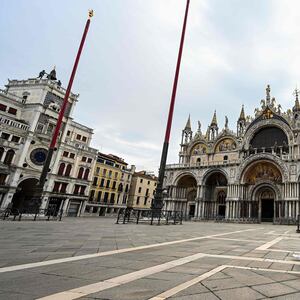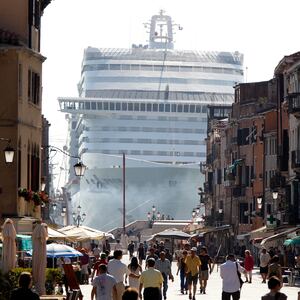VENICE—Ah, Venice... The world’s favorite romantic getaway is synonymous with amorous trysts, and not always on the up and up. For centuries, the city—which by no small coincidence is the birthplace of legendary lover Casanova—has been a magnet for romantic affairs by politicians, Hollywood elite, and regular people. Hotels have long offered discreet services, secret entrances and private dining rooms so couples who shouldn’t be seen together won’t be. Paparazzi know well that if a rumor is swirling about a famous affair, all bets are on that the lovebirds will eventually end up in Venice. George Clooney and Amal Alamuddin were first spotted as a couple here and loved the city so much they returned to get married.
But a new surveillance and tracking system—which would make it impossible to remain anonymous in the city—could throw cold water on the hotspot.
The Venetian city government has now started gathering cellphone data of everyone who enters the city—without telling them outright. From now on, it won’t be just masks in shop windows looking out on the streets, as thousands of surveillance cameras have also been installed on ancient palaces, ornate lamp posts, and on almost every romantic canal. The reason, according to Venice Mayor Luigi Brugnaro when he announced the plan recently, is to monitor the flow of tourist jams and eventually control the number of people who can enter the city.
ADVERTISEMENT
Next spring, before tourist season revs up, the city will then start installing long-awaited turnstiles that keep track of people who enter and can be closed off quickly to non-residents (who will have a pass to go to their homes) if the city is deemed over capacity. And by next summer, everyone will have to book a reservation—and pay a fee—to even get into the city center at all, the Venice Tourism office told The Daily Beast. And an anonymous “Mr. & Mrs. Jones” rendezvous won’t work since visitors will have to give valid identification, meaning all trysts are off.
The new measures should help stem the influx of mass tourism, which has caused untold harm to the ancient city for decades and something Venetians realized they could live without during the pandemic. But it will also scare off people who are concerned with privacy, Maria Volante, a desk clerk at the red velvet-roomed Ca Maria Adele told The Daily Beast. “Couples often come to Venice to get away from prying eyes and the new measure will make some reconsider the city as a destination,” she said. “If you know your phone is being tracked or you have to register with the city just to come for a romantic dinner, many people won’t.”
On St. Mark’s square, couples enjoying a late afternoon Spritz on a recent October afternoon had mixed feelings. “If it controls the crowds so the city is livable and more enjoyable to visit, who cares,” a French man having a drink with his girlfriend told The Daily Beast. But his girlfriend—who insisted she not be named—adamantly disagreed. “Maybe not everyone wants to have their intimacy part of a public record,” she said. “If cameras are watching and phones are being tracked, it could make people very self-conscious.”
And someone is already watching. A control room has been installed near St. Mark’s Square from which more than a dozen cameras beam images to giant screens. Officials monitor the screens for crowds and cross-reference that with data they’ve collected from tracing phones. That data can then be used to paint a demographic picture of who is in Venice based on age and nationality, every minute of the day. “It gives us valuable data. We know who was here in the square, where they were before they came here, and where they went next,” Simone Venturini, who heads Venice’s tourism office, told The Daily Beast. “Eventually when people have to make a reservation to enter, we will have even more data.”
The data will be used to help determine when to close off the turnstiles and eventually help determine how many reservations to take for peak hours of the day during the high season. It is unclear if the reservation system, once in place, will continue during the off-season, but Venturini says the phone data collection and entrance fee will.
The plan to monitor Venetian tourists and charge what amounts to an entry fee to the city was supposed to start last year, after having passed the 2019 budget with a price tag of $3.5 million, paving the way for the turnstiles to be put in place, but the COVID-19 pandemic delayed the plans. Cruise ship passengers were the chief target since they tend to enter the city in massive groups. But as of 2021, massive tourist ships are no longer allowed to dock in the Venetian city center port, causing many companies to temporarily skip Venice as a stop.
The first turnstile has already been installed in the Tronchetto district and is being used by select groups as a test run. The rest are slated to be installed by September 2022. The phone data and surveillance camera images, however, are already being collected, meaning every stolen kiss or secret rendezvous in Europe’s most romantic city is already part of the public record.







